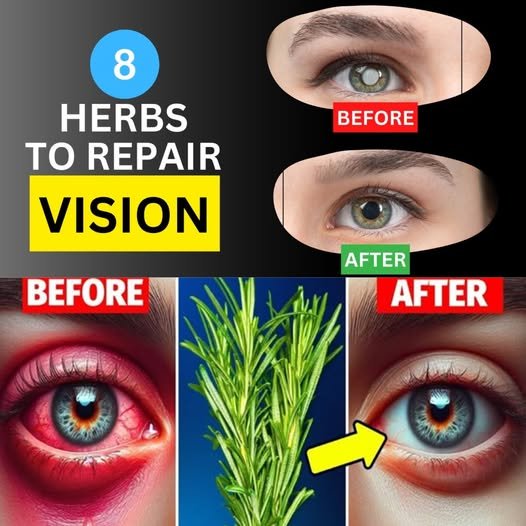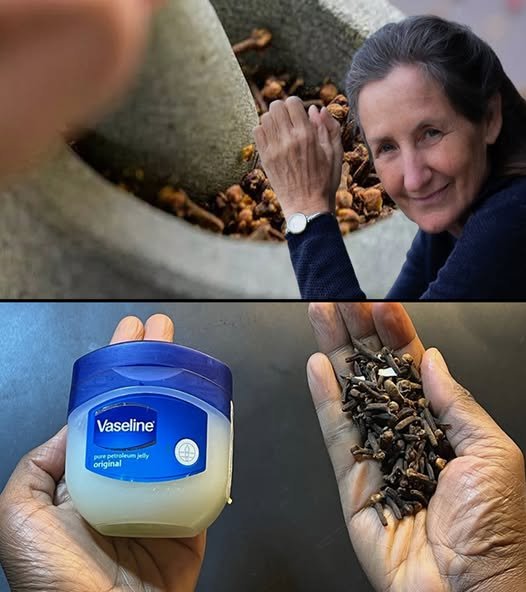Herbs for Eye Protection and Vision Improvement: Natural Remedies for Better Eye Health
Maintaining good eye health is essential for overall well-being, as our eyes play a vital role in how we experience the world. Over time, our eyes are exposed to various environmental stressors, aging, and health conditions that can affect vision. However, nature provides a wealth of herbs and plants that can support and protect eye health. In this article, we will explore eight powerful herbs that can help protect the eyes, improve vision, and prevent common eye problems like macular degeneration, cataracts, and eye fatigue.
1. Bilberry: Enhancing Night Vision and Retinal Health
Bilberries (Vaccinium myrtillus) are rich in antioxidants, particularly anthocyanins, which have been shown to help protect the retina and improve vision. One of the most remarkable benefits of bilberries is their ability to enhance night vision. This is achieved by increasing the production of rhodopsin, a pigment in the retina essential for low-light vision. Bilberries are also known for their ability to strengthen capillaries in the eyes, improve circulation, and protect the eye’s blood vessels from damage.
The high antioxidant content of bilberries helps combat oxidative stress, which is one of the leading contributors to age-related eye conditions, including macular degeneration. By incorporating bilberries into your diet or using bilberry extract, you can significantly improve the health of your eyes and maintain good vision as you age.
2. Ginkgo Biloba: Improving Blood Flow and Protecting Against Macular Degeneration
Ginkgo biloba is a well-known herb that is often used for its cognitive-enhancing effects, but it also provides numerous benefits for eye health. This herb improves blood circulation, which is crucial for maintaining healthy eyes. Ginkgo biloba helps increase blood flow to the eyes, ensuring that the eye tissues receive enough oxygen and nutrients to function properly.
By improving circulation, ginkgo also helps protect against age-related macular degeneration (AMD), a condition that affects the central part of the retina and can lead to vision loss. Additionally, ginkgo’s ability to enhance blood flow supports the prevention of diabetic retinopathy, a complication of diabetes that can lead to blindness if untreated. Ginkgo biloba’s antioxidant properties also contribute to protecting the eyes from oxidative damage caused by free radicals.
3. Ibrite: Soothing Irritation and Reducing Eye Redness
Ibrite (Episcia cupreata) is an herb known for its anti-inflammatory and soothing properties, making it an excellent remedy for irritated and swollen eyes. Ibrite can be particularly useful for individuals experiencing redness, swelling, or itchiness in the eyes, often caused by environmental allergens, pollution, or extended screen time.
Ibrite is also beneficial for its antioxidant properties, which help reduce oxidative stress and inflammation in the eyes. This can aid in reducing the risk of long-term damage from chronic irritation and prevent the development of conditions like dry eyes. By incorporating Ibrite into eye health regimens, you can soothe irritation, reduce eye fatigue, and protect the eyes from long-term damage.
4. Turmeric: Anti-inflammatory and Antioxidant Benefits for Eye Health
Turmeric (Curcuma longa) is a vibrant yellow spice that contains curcumin, a compound with powerful anti-inflammatory and antioxidant properties. Curcumin has been shown to be highly beneficial for eye health by reducing inflammation and protecting the eyes from oxidative stress. Chronic inflammation and oxidative damage are key contributors to eye diseases such as cataracts, glaucoma, and macular degeneration.
By incorporating turmeric into your diet, either as a spice in food or through supplements, you can support your eye health by improving circulation to the eye tissues, reducing inflammation, and preventing age-related degeneration. Its antioxidant properties also help protect the lens of the eye from damage, making turmeric an essential herb for those looking to improve their vision and protect their eyes over time.
5. Saffron: Carotenoid-Rich Herb for Retinal Health
Saffron (Crocus sativus) is not only a luxurious spice but also a potent herb for improving eye health. It contains powerful antioxidants like carotenoids, which have been shown to protect the retina and prevent damage from oxidative stress. One of the key carotenoids in saffron, crocin, has been linked to improved visual function and retinal protection.
Studies have demonstrated that saffron can help improve macular function and protect against macular degeneration, a leading cause of vision loss in older adults. Additionally, saffron’s antioxidant properties help combat free radicals, which can damage the cells in the eyes and lead to the development of eye conditions like cataracts and glaucoma. By adding saffron to your diet, you can improve your vision and protect your eyes from age-related degeneration.
6. Grape Seed Extract: Protecting the Eyes and Preventing Cataracts
Grape seed extract (Vitis vinifera) is rich in antioxidants, particularly proanthocyanidins, which have been shown to have a protective effect on eye health. These powerful antioxidants help maintain the health of the blood vessels in the eyes and reduce oxidative damage that can lead to cataracts, macular degeneration, and other eye conditions. Grape seed extract is also effective at improving circulation in the eyes, ensuring that the eye tissues receive the oxygen and nutrients they need for optimal function.
In addition to its antioxidant properties, grape seed extract has anti-inflammatory effects that help reduce inflammation in the eyes. By incorporating grape seed extract into your routine, you can protect your eyes from oxidative stress, prevent cataract formation, and maintain healthy vision as you age.
7. Green Tea: Antioxidant Protection Against Eye Diseases
Green tea is well known for its numerous health benefits, and its positive effects on eye health are no exception. Rich in polyphenols, particularly catechins, green tea provides powerful antioxidant protection for the eyes. These antioxidants help protect the eyes from oxidative stress, which can lead to the development of age-related eye diseases such as macular degeneration and cataracts.
Green tea also has anti-inflammatory properties that can help reduce inflammation in the eyes, improving overall eye health. By drinking green tea regularly, you can protect the eyes from damage caused by free radicals, reduce the risk of developing eye diseases, and promote healthy vision. The catechins in green tea also improve blood flow to the eyes, ensuring that the eye tissues receive adequate nutrients and oxygen for optimal function.
8. Fennel: Nourishing the Eyes and Reducing Damage
Fennel (Foeniculum vulgare) is an herb rich in essential nutrients and antioxidants that support eye health. Fennel contains vitamin C, vitamin A, and beta-carotene, all of which contribute to maintaining healthy vision. These nutrients play a crucial role in protecting the eyes from oxidative stress and free radical damage, which can lead to conditions like cataracts and macular degeneration.
In addition to its antioxidant properties, fennel also contains flavonoids and minerals that help nourish and protect the eyes from damage. Fennel is known for its ability to improve eye moisture and prevent dry eyes, making it a valuable herb for individuals who spend long hours in front of screens or are exposed to dry environments.
Conclusion: Natural Herbs for Eye Protection and Vision Improvement
Taking care of your eyes and preserving your vision is essential for maintaining a high quality of life, especially as you age. The herbs mentioned above—bilberry, ginkgo biloba, Ibrite, turmeric, saffron, grape seed extract, green tea, and fennel—are all excellent natural remedies for improving eye health, protecting the eyes from damage, and enhancing vision.
These herbs are rich in antioxidants, anti-inflammatory compounds, and nutrients that support healthy circulation, protect against oxidative stress, and help maintain healthy eye tissues. By incorporating these herbs into your daily routine, whether through dietary changes, supplements, or teas, you can improve your eye health and protect your vision for the long term.
Disclaimer: The information provided in this article is for educational purposes only and should not be considered as medical advice. Always consult with a healthcare professional before incorporating any herbs or supplements into your routine, especially if you have underlying medical conditions or are taking other medications.



